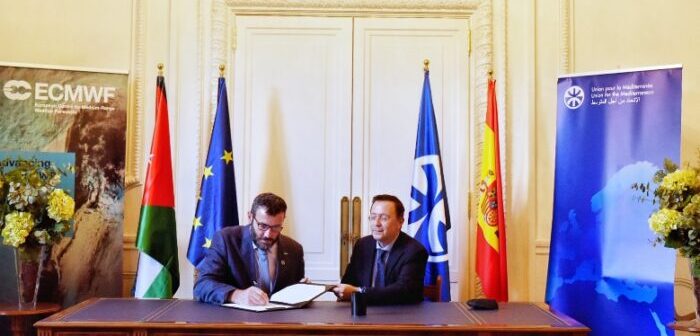The European Centre for Medium-Range Weather Forecasts (ECMWF) has signed a partnership agreement with the Union for the Mediterranean (UfM) to support all member countries in accessing the critical data needed to tackle Mediterranean climate change challenges.
Over the next few years, ECMWF, as entrusted entity to implement the Copernicus Atmosphere Monitoring Service (CAMS) and the Copernicus Climate Change Service (C3S), will work closely with the UfM to develop targeted training sessions and materials for knowledge transfer and capacity building in the region. They will also develop a joint free and open data dashboard with easy-to-use indicators and information for the UfM countries to maximize the uptake of climate and atmosphere monitoring data products from Copernicus in all relevant regional initiatives.
The EU’s CS3 recently announced that Europe had witnessed its hottest summer on record in 2021. Wildfires raged in many countries along the Mediterranean coastline, while several countries experienced their worst flooding in decades. Meanwhile, the recent publication by the network of Euro-Mediterranean scientists MedECC, supported by the UfM, showed that the Mediterranean basin is warming up 20% faster than the global average and that the region is one of the main climate change hotspots in the world.
The UfM and the ECMWF, which has one of the largest supercomputer facilities and meteorological data archives in the world, signed the agreement to tackle the urgent need to collate the most advanced environmental knowledge in the Mediterranean basin and make it readily accessible to policymakers, experts and citizens.
Nasser Kamel, secretary general, UfM, said, “The Mediterranean has been called a hotspot of climate change and biodiversity loss over and over again. The subsequent question is how we can improve the ways in which scientific evidence is constructed, integrated and communicated, so it can contribute more effectively, efficiently and quickly into policy formulation. The science-society-politics interface allows hard-won evidence to turn into concrete policies for our region. This is why the UfM, and ECMWF collaboration will allow our region to be a pioneer in good practices and an example in formulating regional policies in the fight against climate change.”
Florence Rabier, director general, ECMWF, said, “ECMWF is delighted to have signed this new collaboration with the UfM. Through our activities within the EU-funded Copernicus Climate Change and Atmospheric Monitoring Services, we aim to support the Mediterranean countries with comprehensive and policy-critical data. Our goal is to enable climate adaptation and mitigation initiatives at the European level and beyond in order to tackle the pressing challenges of climate change. By leveraging existing infrastructures and knowledge with the involvement of national service providers and unions like the UfM, we can foster the best environment to move forward in creating sustainable climate practices.”
This article was originally posted on the ECMWF website, and can be viewed here.
Headline adapted to suit the Meteorological Technology International website. Content shared under Creative Commons — Attribution 4.0 International — CC BY 4.0



